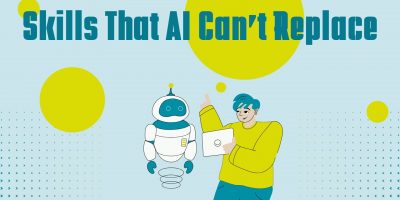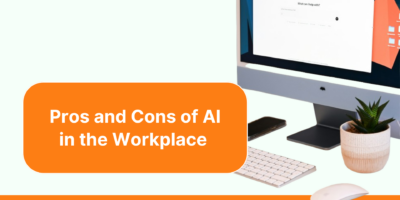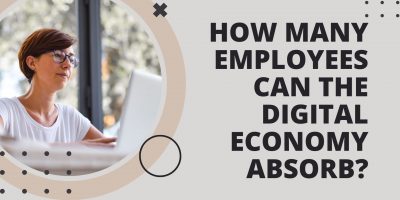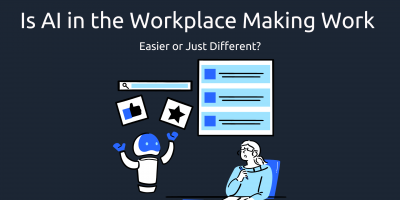
Skills That AI Can’t Replace
Which skills are futureproofed with an irreplaceable “human touch,” and how are emerging technologies driving the evolution of workforce skills?


Head of People at PhotoAiD

Marketing Specialist at Resolute Technology Solutions

Founder & CEO at Siddhi Yoga

Head Of Marketing at ChecksSocial
HR leaders must respond to the rapidly changing world of work, from hybrid work models to reskilling the workforce to the heightened expectations of diversity and inclusion.
As such, the adoption of the latest technologies and AI capabilities continues to become increasingly vital in staying ahead under new dynamic work conditions. To gain a deeper insight into how AI is transforming businesses, we asked leaders in various industries to share their perspectives on the value of AI in HR.
You might not be aware, but artificial intelligence plays a big role in our everyday lives. Most of us carry AI-powered smartphones in our pockets, interact with Siri and Alexa, or dream of owning a self-driving car.
One simplistic way to describe AI is to think of it as the process of training a computer to learn how to think like humans. Artificial Intelligence (AI) is broadly defined as the branch of computer science concerned with developing machines capable of performing tasks, thinking, and working like humans. Some examples of AI are:
As a result, AI can perform various human-like cognitive tasks, such as problem-solving, learning, speech recognition, and reasoning.
Forward-thinking companies recognize the vast array of business problems that can be solved using AI and accelerate their growth. According to one statistic, 58% of businesses now use AI for at least one function in the workplace.
The recent attention AI has received is closely tied to machine learning, a technique for developing AI systems using real-world examples.
Machine learning is an approach that allows AI to solve problems. Simply put, machine learning feeds computers large data sets and uses statistical and mathematical models to “learn” and find patterns.
This technique eliminates the need for millions of lines of written code, as ML algorithms learn through “training.” By identifying patterns that humans would likely miss and correlations in data, we can use ML to obtain key insights and predictions. As a result, businesses can use this data to improve decision-making and impact key growth metrics.
Understanding the difference between artificial intelligence and machine learning can be confusing. Most people tend to use the terms synonymously and do not know how the two differ.
While they are related, artificial intelligence and machine learning are two different concepts.
The biggest difference is that machine learning does not need to be programmed, while AI is code that is based on inputs. Often, artificial intelligence is used as a blanket term to describe various technologies.
Most AI-based tools use machine learning to improve through experience and use real-world examples called “training data.” For example, a machine learning algorithm trained to predict turnover would typically look at historical records to identify patterns and correlations in the types of people who have previously left the organization. Therefore, it is essential to know the source of the training data the ML is using and the inputs and outcomes.
The machine learning approach applies to various use cases, meaning AI-based tools are available for every industry and economy. The field of human resources is no exception, as one estimate suggests there are over 250 different AI-based HR tools available.
Clearly, artificial intelligence has gained sizeable attention and excitement in recent years. However, as an emerging technology, the full impact of AI and ML in the workplace has yet to be discovered. While most of the attention has been paid to improving talent acquisition efforts, developers create AI tools for every HR and employee life cycle stage.
These tools promise to carry out HR operations more effectively and manage people in fairer ways. However, that is not to say that AI will not take over HR completely. Current AI capabilities are still limited in many ways and come with numerous challenges.
Maciej Kubiak, Head of People at PhotoAiD, reflected on the significance of AI in HR analytics. He stated, “Without replacing the human component of HR management processes, Artificial Intelligence permits automating some processes and maximizing the functioning and effectiveness of business performance.
However, we can be victims of neophobia: the fear of new things; rejecting artificial intelligence because it scares us. On the contrary, I think we should welcome artificial intelligence with positivity. That does not mean to be replaced by robots but to relieve HR of its repetitive, time-consuming tasks and focus on more complex assignments.
For instance, implementing chatbots to manage applications can be an effective solution for collecting relevant information about the candidate, thus being able to make an initial selection, reducing the time to hire.
By now, you might ask yourself, how do AI technologies like face recognition or natural language processing (NLP) add to HR processes? Well, the answer is simple – efficiency. AI can take on most of the low-value administrative burden around HR processes. Some of the benefits of using artificial intelligence in human resources processes are:
Through the automation of repetitive and tedious tasks, HR professionals can free up their time to focus on more humanistic tasks, like improving the employee experience.
Ultimately, for AI to contribute to a company’s bottom line, companies need to scale the technology across the organization and infuse it with core business processes, workflows, and customer journeys to optimize daily operations.
As one research suggests, organizations that produce dozens of risk-ready, reliable AI models are more likely to realize scale and value, adding as much as 20 percent more to their earnings before interest and taxes (EBIT).
AI in HR helps address long-standing HR challenges and improve processes, leading to better business outcomes. However, despite the wide range of possibilities and the heightened interest in AI, there is also much apprehension from HR professionals. While having various tools can transform the way HR contributes to an organization, it can also create an increasingly confusing and complex landscape to navigate.
Many workers, HR professionals, and even CEOs simply do not have the technical expertise to assess AI-based tools and know the ins and outs of data encryption, cybersecurity, and complex algorithms. As a result, this causes distrust in AI techniques, and a lack of adoption of AI technology leads to wasted investments. To increase the stakeholder’s trust in AI, organizations must address, communicate, train, and provide guidance on how the systems work.
Without an explainable model and transparency, adoption by HR professionals and frontline workers is impossible, and the risk of poor decisions, misused tools, and reputational and legal consequences is greater. AI systems need to provide a certain level of explainability for their comprehensible decisions to humans.
In high-risk situations, such as medical diagnoses in healthcare, or financial services like lending, there needs to be a greater level of explainability. In specific low-risk applications, like chatbot scheduling interviews, it may not be necessary to grasp the workings of algorithms.
In addition, the use of AI in human resources opens the possibility for concerns about data privacy, security, and bias. There is a growing demand for establishing principles for the ethical use of artificial intelligence, or so-called “responsible AI.” In fact, the European Union has already announced the move to regulate the use of AI, stating they aim to develop secure, trustworthy, and human-centered artificial intelligence.
While machine learning and artificial intelligence are often perceived as objective or impartial, the possibility of encoding existing biases in them is always present.
Without an explainable model and transparency, adoption by HR professionals and frontline workers is impossible, and the risk of poor decisions, misused tools, and reputational and legal consequences is greater. AI systems need to provide a certain level of explainability for their comprehensible decisions to humans.
In high-risk situations, such as medical diagnoses in healthcare, or financial services like lending, there needs to be a greater level of explainability. In specific low-risk applications, like chatbot scheduling interviews, it may not be necessary to grasp the workings of algorithms.
Another challenge in using artificial intelligence in HR is to acknowledge its limitations. How do we measure employee potential, assess candidates’ soft skills, and choose which measurable criteria are vital for job openings?
Machine learning’s ability to learn on training data is not just its most extraordinary power but also its most significant limitation. As such, organizations need to guard against “data myopia.” Simply put, this term means that some aspects of the real world can’t translate into a digital database.
AI requires ongoing maintenance, monitoring, and updating to optimize the outcomes. The training data is based on past examples, but our world is constantly changing rapidly. To support AI’s reliability, predictability, and accuracy, organizations need to ensure the quality of the data used and its relevancy and align it with real-world conditions.
The most promising AI use cases in HR for integrating AI-based solutions are talent acquisition, talent management, and learning and development (L&D). These areas of HR still involve a large number of time-consuming tasks that rely on humans, depend on human judgment or intuition, and therefore have a certain level of bias.
Effective recruiting is crucial to modern businesses. However, talent acquisition efforts often suffer from several well-known challenges.
First of all, considering the average time to fill roles is 26 days, this HR task is incredibly time-consuming. As we face one of the biggest labor shortages since WW2, this figure is only estimated to increase.
As we already mentioned, the next challenge is the hiring process rooted in subjectivity. Recruiters relying on traditional, manual methods of selecting, screening, and interviewing candidates are more prone to making unconsciously biased decisions. And the final most notable challenge is that hiring is often reactive instead of proactive. Organizations often react to past events rather than strategically prepare and predict future workforce needs.
All of these challenges can be addressed with the use of AI. Adopting AI-driven applicant tracking systems (ATS) and other machine learning applications can make this process faster, more communicative, and seamless. ML algorithms learn words commonly used in CVs, like “supervise” or “manage,” and match these to an open job requisition. AI systems can also administer skills and aptitude tests to rank candidates for suitability. AI hiring helps identify, recruit, and retain the best applicants and top talents.
AI also creates a more engaging and personalized hiring experience by allowing onboarding to occur 24/7. Digital assistants and chatbots can answer the most frequently asked questions, guide the candidate through the hiring process, and suggest job-related learning to shorten the time to productivity.
Colton De Vos, a Marketing Specialist at Resolute Technology Solutions, shared the use of AI features to source candidates by stating, ”For our hiring, I’ve used some of the AI-enabled and Smart features that Indeed and LinkedIn are now offering to identify right-fit candidates and proactively reach out to them.
In my experience, these features are getting better at filtering and building lists of candidates that fit the job and company requirements but still need some work on the outreach aspect.
Sometimes the AI engine reaches out to the candidate multiple times if they have created duplicate profiles, or it won’t use enticing enough language matched to the candidates’ specific experience and background. The sourcing part of recruitment is getting stronger with AI enablement, but targeted outreach is still getting to a point where it can rival human outreach in terms of messaging and sanity checks.”
The days when workers stayed with one employer for their entire career are long gone. In a fast-moving economy and tight labor market, employees can seek career development opportunities elsewhere.
The pandemic has also further exacerbated the need for upskilling, reskilling, and creating inward mobility of workers. Millennials and younger workers consider career progression a top priority, so organizations need to take a strategic approach to career pathing to retain employees. Implementing an enterprise learning management system (LMS) can give organizations a competitive edge by helping them close skills gaps, encourage improvement and engage top talent.
AI can create personalized career recommendations and curate tailored learning content that acts as guidance to maximize an employee’s potential. Employees can get relevant and meaningful content by learning from an optimized learning curriculum based on role, engagement, and preferred learning methods. Virtual reality (VR) and Augmented reality (AR) training allow employees to learn in virtual workplace settings that are otherwise deemed too dangerous or expensive.
Artificial intelligence can also promote cross-functional and collaborative learning from employees from different departments and enhance team performance.
Meera Watts, Founder & CEO at Siddhi Yoga, expressed, “I believe that while AI cannot completely replace humans in HR, it may bring significant changes in how things work. AI in HR aims to streamline repetitive tasks to enable human workers to focus on value-adding work. It will majorly focus on Learning and Development.”

The future of work demands that employers answer calls for a more sustainable way of life and a human-centric approach to growth and development.
HR professionals now have various AI tools available to directly address specific goals, the most common of which are improving diversity and inclusion, practicing corporate social responsibility (CSR), or supporting mental health initiatives.
Employee well-being needs to be a top priority for organizations as workers push for better work conditions, greater flexibility, and improved work-life balance. One study found that 78% of full-time U.S. employees reported at least one mental health symptom: burnout, depression, or anxiety.
As much as 82% of people are open to having an AI-powered therapist or chatbot counselor and believe it can help them better than humans.
Another area where HR can use AI is to aid in creating a culture of inclusiveness and fairness. For example, AI can recommend job postings in a language that attracts more diverse applicants, “be blind” to the gender and race of applicants or screen them as a cultural fit with an organization.
Jenna Schroeder shared an insightful finding from CheckSocial on cultivating a positive work culture, “We’re using AI to provide social media screening to HR teams, to empower them to assess their candidates for cultural fit, prevent racism, sexism and other bad behaviors entering the workplace and reduce reputational risk.
Our AI scans a candidate’s online activity across social media, new stories, web forums, the dark web, and more – and provides a report to HR teams to assess them as part of the hiring process.
We’ve found that one in five will have red flags, and one in ten are likely high-risk hires.
We see this as something most organizations will be doing in the future – it’s definitely a game-changer as 75% of employers already look up their candidates on social media – but this comes with a risk of them applying their own biases and can lead to discrimination.”
Artificial intelligence and machine learning transformed and will continue to impact the HR profession and people management role. While the initial function of the human resource department was an administrative one that handled recruitment and paperwork, nowadays, HR can contribute in more meaningful ways.
As machine learning technology improves, HR has shifted to a more strategic and critical player in an organization. The addition of AI to your HR strategy enables HR professionals to obtain insightful metrics about the workplace. Now, we can measure employee engagement & efficiency, analyze hiring decisions, determine succession plans, rank the employee experience, and examine the overall work climate.
A strategic HR function provides valuable and actionable data for leaders and managers as it can give an overview of the workplace. Companies can use these HR analytics to make better-informed and data-supported decisions and respond to challenges.
The adoption of AI in HR reveals future trends and can predict behaviors and future talent needs. People analytics, decision intelligence, and business intelligence are now at the core of the essential HR function.
Emerging HR software and technologies focus on creating a best-in-class workplace and fostering an employee-centric culture. As such, the trends for this year are all centered around creating hyper-personalized experiences and a better workplace with more sensitivity to individuals’ likes, dislikes, and preferences. The latest technology puts the employee first and inserts humanity into applications, processes, and systems.
One surging trend is sentiment analysis, which was only a tool used for marketing purposes, but is now adopted by HR departments.
Gaining a more profound knowledge of employees’ needs and concerns is a powerful tool.
Additionally, as AI plays a more significant role in HR, many companies are introducing bias bounties to ensure ethical AI, as often hidden biases manage to seep through in algorithms. Increased accountability along with transparent tech practices are certainly here to stay.
Organizations increasingly focus on addressing skills gaps and operational challenges, aligning available talent with current and future business needs, and ensuring agility in an ever-changing business landscape. Harnessing the power of AI in HR gives strategic insight and transforms the way organizations operate, contributing to their competitive advantage.
Browse our curated list of vendors to find the best solution for your needs.
Subscribe to our newsletter for the latest trends, expert tips, and workplace insights!

Which skills are futureproofed with an irreplaceable “human touch,” and how are emerging technologies driving the evolution of workforce skills?

As machines take on more at work, the question isn’t how fast AI can go, but whether we’re ready for where it’s taking us.

Explore the implications of technology on the inevitable shift of the labor market and what this would mean for the future of work.

With the rise of AI in the workplace, its impact has become multi-dimensional. While there is no doubt about its ability to reduce manual labor, this technology also reshapes job expectations, creating new opportunities and challenges.
Used by most of the top employee benefits consultants in the US, Shortlister is where you can find, research and select HR and benefits vendors for your clients.
Shortlister helps you reach your ideal prospects. Claim your free account to control your message and receive employer, consultant and health plan leads.